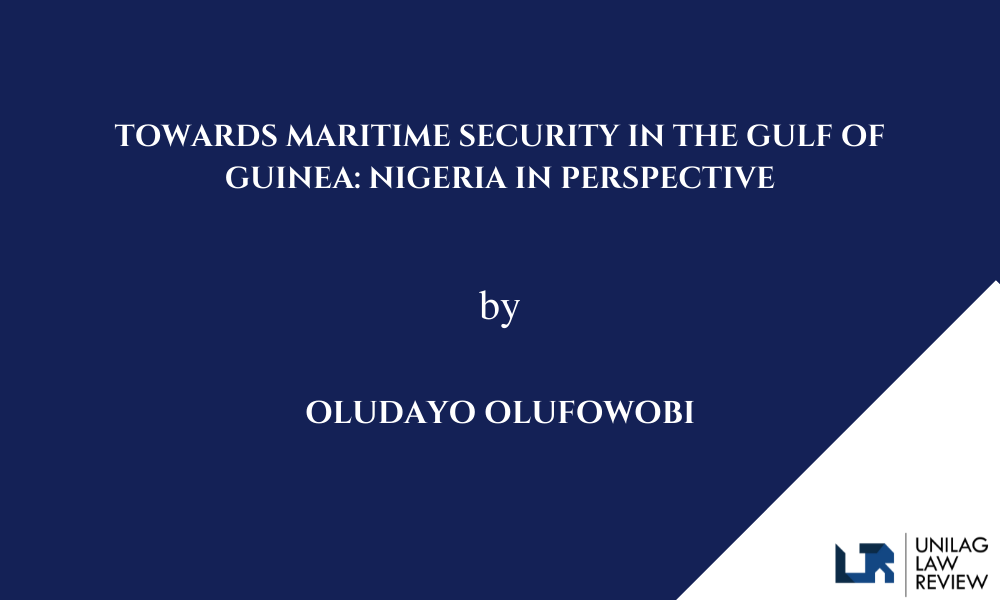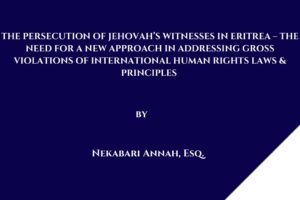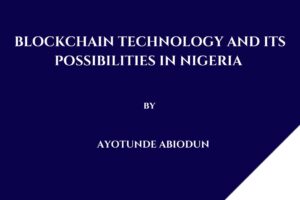TOWARDS MARITIME SECURITY IN THE GULF OF GUINEA: NIGERIA IN PERSPECTIVE

Abstract
The Gulf of Guinea (GoG) has gained notoriety as “The New Danger Zone”. Maritime insecurity is a major regional problem compromising the development of this strategic economic area and threatening maritime trade in the short term and stability of coastal areas in the long term. The author examines pre-existing legal frameworks whilst recognizing the need for the GoG countries to press for dynamic cooperation to fill the security vacuum in the territorial waters and to work multilaterally towards improved economic governance.
1.0 INTRODUCTION
The GoG is a vast area: 6000 kilometers of coastline stretching from Senegal in the north to Angola in the south, with 16 sovereign coastal states and islands including a number of landlocked states. This area spans two regions, namely West and Central Africa; comprising Sierra Leone, Senegal, Liberia, Côte D’Ivoire, Ghana, Togo, Benin, Nigeria, Cameroon, Equatorial Guinea, Gabon, Sao Tome and Principe, and Central African Republic of Congo, Democratic Republic of Congo and Angola.[1] The GoG region currently accounts for 10 per cent of oil and four per cent of natural gas imports to the European Union (EU).[2]. The discovery of offshore hydrocarbon fields also underlies the region’s geostrategic significance (It produces about 5.4 million barrels of crude oil per day).[3] The attacks in the GoG, consisting of both piracy at sea and armed robbery; with the latter accounting for the majority and specifically also petro-piracy, are carried out by organized networks and frequently targeting oil drilling and tankers for oil and cargo theft, have incurred significant financial costs to both coastal states and foreign investors amounting to an excess of USD 818 million in 2017 alone.[4] Transport lines are increasingly vulnerable to disruption, thus, having a massive impact on economic interactions between the region and foreign partners. Recent figures from the International Maritime Bureau show a 70 per cent increase annually in actual and attempted attacks in the region between 2017 and 2018, while in 2019 there were double-digit incident reports.[5] Indeed, the region is replete with weak States, high circulation of small arms and light weapons (SALWs), oil theft, sea piracy and insurgency.[6]
Without a doubt, the GoG is a major hub of commercial exports of hydrocarbons and imports of manufactured goods, food items and huge equipment. Hence, its huge economic prospects which if curtailed may derail the economic growth of the GoG countries, their global trade partners and other parties with strategic interests in the potentials of the region.[7]
Undoubtedly, maritime security is sacrosanct for exploiting maritime resources, securing livelihoods and sustainable development. Yet, persistent challenges faced in the region, such as maritime boundary disputes, smuggling and trafficking of illicit goods pose threats to the work of regional economic communities (RECs) in addressing maritime security challenges; render negative impacts on work towards achieving a Blue Economy in the region and hamper maritime regime building. Hence, it behoves Member States to frame within national and regional policies, strategies that go beyond immediate needs and reactive engagement.
2.0 SCOPE OF MARITIME INSECURITY IN THE GoG
The thriving of a global maritime economy has inevitably led to a corresponding rise in maritime insecurity. This is owing to the fact that since 2008, maritime areas have become easy channels for the easy inflow of activities of criminals exacerbated by the vulnerability of many States that have been unable to impose controls on their territory due to sea blindness, aggravated by the fact that oceans are by nature grey areas with the immensity of their stretch making them elusive to state control.[8] Such ungoverned zones become production sites or transit routes for different criminal activities particularly the trafficking of drugs and arms.[9]
Not to forget that this insecurity is equally fueled by poor policy implementation, economic factors, weak law enforcement and facilitated by abysmal security occasioned by poor governance and high corruption,[10] with its ripple effect on a hike in maritime insurance cost, the cost to food price inflation, potential environmental impact, foreign revenue and the global economy. Despite the persistent trend to prioritize piracy, it is imperative to understand the extent of these threats which were mapped according to a 2013 study by Friedrich Ebert Stiftung, as inclusive of acts of violence at sea, trafficking in drugs and illegal substances, organized transnational crime, and illegal fishing alongside ecological risks.[11] West Africa loses as much as USD 1.3 billion to Illegal, Unreported and Unregulated (IUU) fishing annually.[12]
Topping piracy charts in 2018 with 31 attacks,[13] Nigeria remains the hub from where most threats stem- activities of quasi activist-political groups cum rebel entities such as the Niger Delta Avengers pose threats to the illegal fishing industry. Nigeria’s oil production and exports have become a gravitating force that is now the measure of insecurity in the Gulf of Guinea region.[14]
3.0 ACTIONS THUS FAR
3.1 The Domestic Level- Nigeria
Nigeria’s operational efforts are focused along two lines:[15]
3.1.1 Cooperative Efforts (with regional and international partners):
Working with neighbouring states in joint patrols (Operation prosperity to tackle piracy in Benin Republic), Maritime information-sharing mechanisms, Embarked Officers, and Joint Exercises.
3.1.2 Nigerian interagency efforts which are focused on the “Deep Blue Project” –
This includes expanded navy, aviation and land assets, satellite surveillance systems and an advanced command and control center.
Nigeria has blazed the trail in the maritime security efforts in the GoG. Regionally, Nigeria’s intervention led to the establishment of the Economic Community of West African States (ECOWAS), Integrated Maritime Security Strategy (EIMS), Inter-Regional Coordination Center (ICC) in Yaoundé and the African Integrated Maritime Security (AIMS).[16] Also, in promulgating a standalone law to fight piracy, President Buhari on 24 June 2019 assented to the “Suppression of Piracy and Maritime Offences Bill”, aimed at ensuring safe shipping at sea, prosecuting infractions and criminalizing piracy; and this fulfilled the International Maritime Organisation’s requirement for a separate legislation against piracy to promote global shipping.
The Nigerian Navy (NN) has remained at the forefront of efforts to build synergy necessary for strengthening maritime security and law enforcement within Nigeria and the GoG, through bilateral and multilateral efforts. Subsequently, there has been the promulgation of the Harmonized Standard Operating Procedure (HSOP) which seeks to resolve the lack of common understanding and limited synergy among the Maritime Law Enforcement Agencies (MLEAs) while providing guidelines for collaboration against sea crimes. Further, through the signing of a MoU between Chiefs of Naval Staff of Benin, Togo, Niger and Nigeria under the auspices of the Multi-National Maritime Coordination Center in Benin Republic for Zone E Member States, there has been continuous joint multilateral patrol by member countries through joint maritime and air patrol and active collection and dissemination of information. The Increase presence of the Nigerian Navy at sea has led to a 50 per cent reduction of acts of piracy between Q1 2018 and Q1 2019.[17]
3.2 Regional Efforts
A number of regional associations have been effectively involved in countering piracy in the region, amongst which are:
- The Gulf of Guinea Commission (GGC) created in 2001 but became operational in March 2007, when its Executive Secretariat was set up in Luanda.
- The Economic Community of West African States (ECOWAS).
- The Economic Community of Central African States (ECCAS)
- The Maritime Organization of West Central Africa (MOWCA) established to ensure a cost-effective shipping service for sub-regional countries focusing on safety and combatting pollution.
The GGC has the mandate of ensuring peace, security and stability needed for economic development within the region. It postulates, among others, that in response to increasing maritime insecurity, GGC States need to establish regional cooperation and interstate dialogue with issues such as arms proliferation, crude oil theft, terrorism and migration; with a permanent mechanism for enforcing and maintaining peace within the region.
There has been a visible regional dichotomy between actions and progress in West and Central Africa; with the latter under ECCAS having a more advanced and robust maritime security agenda than the former. The ECCAS promotes information sharing and management, joint patrol and surveillance of maritime space, the harmonization of actions at sea, the introduction of a regional maritime tax regime, the acquisition of equipment for joint use and the institutionalization of a periodic maritime conference. The ECOWAS has adopted much of the ECCAS Model, in principle and signified the urgency of the need for greater commitment towards information sharing, asset coordination and integration. However, in response to United Nation Security Council Resolution 2018(2011) and 2039(2012) on the need for anti-piracy and regional cooperation, ECOWAS and ECCAS during their meeting in Benin from 26-29 March 2012 signed an MoU to combat piracy, robbery at sea and other illicit activities in the region.[18] This culminated in the Yaoundé declaration of June 2013 in which Heads of Government from ECOWAS and ECCAS agreed to establish a Maritime Inter-Regional Coordination Center (MICC) in Yaoundé, Cameroon. These efforts are supported by the G7 Friends of the GoG Group( G7++FOGG) comprising Germany, Canada, USA, Italy, Japan, UK, France, Belgium, Brazil (observer),South Korea, Denmark, Spain, Norway, Netherlands, Portugal, Switzerland, the European Union, United Nations Office on Drugs and Crime(UNODC) and the International Criminal Police Organization (INTERPOL).
Furthermore, there is the Maritime Trade Information Sharing Unit for the Gulf of Guinea (MTISC-GoG) which was tested in 2013 and 2014 during the regional maritime exercise- Obangame Express[19] and provides participating vessels with 24-hour-per-day security reportage, and information to national maritime operational centers in the region and INTERPOL.
3.2.1 The Yaoundé Declaration on the Gulf of Guinea
The Declaration aims to increase regional counter-piracy cooperation[20] and contains two key resolutions which are the creation of an inter-regional Cooperation Center on Maritime Safety with its headquarters in Yaoundé, and the implementation of a new Code of Conduct Concerning the Prevention and Repression of Piracy, Armed Robbery against Ships, and Illegal Maritime Activities in West and Central Africa. It recognizes the principles of sovereign equality and territorial integrity of states and of non-intervention in other states’ domestic affairs.[21]
The Center was inaugurated in September 2014 to enhance the activities geared towards cooperation, coordination and systems inoperability as well as the implementation of the regional strategy on safety and security within the Central and West African common maritime space[22]; through a unique strategy framework to deal with criminality at sea, of safety, security, development and governance dimensions.[23] It is also responsible for training and coordination of activities as well as capacity building of various bodies charged with ensuring maritime safety and security in Member States.
The Code of Conduct was formally inaugurated by the Heads of State and Government in Yaoundé in 2013. It consolidates the existing MoU on the integrated coastguard function network in West and Central Africa and incorporates a number of elements of the Djibouti Code of Conduct (counter-piracy agreement for East African States) but is much wider in scope as it addresses a range of illicit activities at sea such as illegal fishing, drug smuggling and piracy.
4.0 LOOPHOLES/RECOMMENDATIONS
Many provisions of the Yaoundé Declaration are still merely declaratory – with deadlocks in obtaining necessary equipment and personnel, funding problems, and inoperability across communication systems. Many Member States are yet to implement the Code of Conduct in establishing National Maritime Security Strategies, National Maritime Security Committees and designating National Focal Points. Hence, it is recommended that steps are taken towards making the Code binding. In addition, the Yaoundé Maritime Architecture should be reinforced to assist the region in reaching its full operational capacity through sharing with centers and other actors, education and training communication and documentation of harmonized legislation. Also, without prejudice to the need for the G7++ to act as a forum in which stakeholders have a clear-cut agenda for implementing agreed objectives and tackling issues of operational nature; there should be a wider membership base to enhance inclusiveness and stronger multilateral partnership geared towards sustainable capacity development.
It is imperative to establish multilateral legal disposition to foster expedited capture, investigation, prosecution, seizure and confiscation of piracy proceeds. Further, there is currently no clear structure for the coordination of regional and international responses. Response awareness should be expanded to include interaction with deployed forces to effectively utilize the Maritime Domain Awareness for Trade- GoG (MDAT-GoG) for information-sharing; concurrently with higher Voluntary Reporting Areas (VRA) registration and incident reporting, as participation by industry remains below 40%.[24]
Using the Niger Delta Avengers as a case study, there is a strong correlation between maritime security and onshore economic growth- the necessity for infrastructural development, provision of job opportunities and coastal environmental preservation. Hence, it is imperative that Member States government formulate maritime-related policy issues that directly affect coastal citizens. Furthermore, oil companies and stakeholders in the petroleum industries should adopt policies and practices that promote responsible exploitation, community participation and benefit host communities socio-economically.
5.0 CONCLUSION
Member States should enhance their coordination of maritime security architecture, bolstered by cooperation efforts regionally and internationally, although this alone would not suffice. It is imperative that the GoG States equally develop their maritime sectors and even exploit its potential as a viable instrument for foreign policy. Converse to the methodology employed in the Gulf of Aden, there should be an improvement in the quality of governance across States; and accountable, responsible and transparent governments to tackle agitations of marginalized groups manifested in piracy and other crimes if indeed countries are to fully reap the short and long-term benefits of the GoG.
Oludayo Olufowobi is a final year law student at the University of Lagos. Oludayo currently serves as the Editor-in-Chief of the University of Lagos Law Review. He has interests in intersections between law, technology and policy.
[1] C. Ukeje, W.M Ela, African Approaches to Maritime Security- The Gulf of Guinea, (Friedrech, Ebert and Stifting: Abuja, 2013), p. 9.
[2] Jamestown Foundation, “Maritime Insecurity in the Gulf of Guinea: A Greater Role for China?”, (2015) 15:1 China Brief, available at https://www.refworld.org/docid/4b641484.html (accessed 15 October 2019).
[3] “Maritime Security in the Gulf of Guinea” (2013) Report of the Conference held at Chatham House, London, 6 December 2012.
[4] Ibid.
[5] Ibid.
[6] F.C Onuoha,“Piracy and Maritime Security in the Gulf of Guinea: Nigeria as microcosm” (2012) Aljazeera Center for Security Studies, available at https://www.studeies.aljazeera.net (accessed 15 October 2019).
[7] Ibid.
[8] Ibid.
[9] Ibid.
[10] Tepp, E, “The Gulf of Guinea: Military and Non-Military Ways of Combatting Piracy” (2012), available at http://mercury.ethz.ch/serviceengine/Files/ISN/146424/…a7f1…/7.pdf (accessed 16 October 2019).
[11] Francois Very, “Maritime Insecurity in the Gulf of Guinea: Threats, Vulnerabilities and Opportunities” (2016) available at https://www.howwemadeitinafrica.com/maritime-insecurity-guf-guinea-threats-vulnerabilities-opportunites/56080/ (accessed 16 October 2019).
[12] Lisa Otto, “Maritime Security in the Gulf: moving towards actionable outcomes” (2019) available at https://www.africaportal.org/features/maritime-security-gulf-moving-towards-actionable-outcomes/ (accessed 17 October 2019).
[13] Loic Bisson, “Nigeria signs first standalone anti-piracy law in the Gulf of Guinea” (2019) available at (accessed 16 October 2019).
[14] Ibid.
[15] International Maritime Organization Headquarters, “Symposium on Maritime Security in the Gulf of Guinea” (2019) available at https://www.itfglobal.org/sites/default/files/node/news/files/Symposium%20on%20maritime%20Security%20in%20the%20GoG.pdf (accessed 17 October 2019).
[16] Isichie Osamgbi, “Nigeria Committed to Leading War against Maritime Crime in Africa” (2019) available at https://nimasa.gov.ng/press-cener-post/nigeria-committed-to-leading-war-against-maritime-crime-in-africa (accessed 16 October 2019).
[17] “Tackling Maritime Threats and Challenges in the Gulf of Guinea: Contributions of the Nigerian Navy” (2019) available at https://www.google.com/amp/s/www.defenceweb.co.za/security/maritime-security/tackling-maritime-threats-and-challenges-in-the-gulf-of-guinea-contributions-of-the-nigerian-navy/amp/ (accessed 16 October 2019).
[18] Staff sergeant O. Owolabi, “West Africa: ECCAS, ECOWAS Take Steps to Counter Piracy, Robbery At Sea, and Illegal Maritime Activities” All Africa 2 April 2012 https://allafrica.com/stories/201204021286.html accessed 31 January, 2022.
[19] A.A Osinowo, “Combatting Piracy in the Gulf of Guinea” (2015) available at http://www.dryadmaritime.com/combatting-piracy-gulf-guinea/ (accessed 17 October 2019).
[20] A. Holmegren, “Piracy’s Persistence in the Gulf of Guinea” (2014) available at https://www.africandefence.net/piracy-persistence-in-the-gulf-of-guinea/ (accessed 17 October 2019).
[21] See DECLARATION OF THE HEADS OF STATE AND GOVERNMENT OF CENTRAL AND WEST AFRICAN STATES ON MARITIME SECURITY AND SECURITY IN THEIR COMMON MARITIME DOMAIN available at http://www.imo.org/en/OurWork/Security/WestAfrica/Documents/Declaration%20of%20the%20Heads%20State%20and%Government%20on%20Maritime%20Safety%20Security.pdf (accessed 18 October 2019).
[22] Interregional Coordination Centre (ICC), “About the Centre”, available at http://cicyaounde.org/ (accessed 18 October 2019).
[23] ibid
[24] Ibid.


